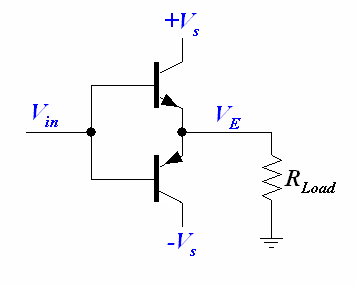Difference between revisions of "Test"
From Mech
Jump to navigationJump to search| Line 1: | Line 1: | ||
. |
|||
====Push-Pull Follower==== |
|||
If we put two emitter followers together (npn transistor for positive |
If we put two emitter followers together (npn transistor for positive voltages; pnp transistor for negative voltages), we get a push-pull follower. |
||
voltages; pnp transistor for negative voltages), we get a push-pull |
|||
follower. |
|||
[[Image:transistor_push_pull_follower.gif]] |
[[Image:transistor_push_pull_follower.gif]] |
||
If <math>V_{in}</math> > 0.7V, then the current is amplified by the |
If <math>V_{in}</math> > 0.7V, then the current is amplified by the npn transistor. |
||
npn transistor. |
|||
If <math>V_{in}</math> < -0.7V, then the current is amplified by the |
If <math>V_{in}</math> < -0.7V, then the current is amplified by the pnp transistor. |
||
pnp transistor. |
|||
Beware that there is a |
Beware that there is a “dead band” when V<sub>in</sub> is between 0.7V and -0.7V, because the voltage has not pass the cutoff voltage for either transistor. This is known as '''crossover distortion'''. |
||
and -0.7V, because the voltage has not pass the cutoff voltage for |
|||
either transistor. This is known as '''crossover distortion'''. |
|||
Revision as of 10:16, 19 August 2009
.
Push-Pull Follower
If we put two emitter followers together (npn transistor for positive voltages; pnp transistor for negative voltages), we get a push-pull follower.
If > 0.7V, then the current is amplified by the npn transistor.
If < -0.7V, then the current is amplified by the pnp transistor.
Beware that there is a “dead band” when Vin is between 0.7V and -0.7V, because the voltage has not pass the cutoff voltage for either transistor. This is known as crossover distortion.

